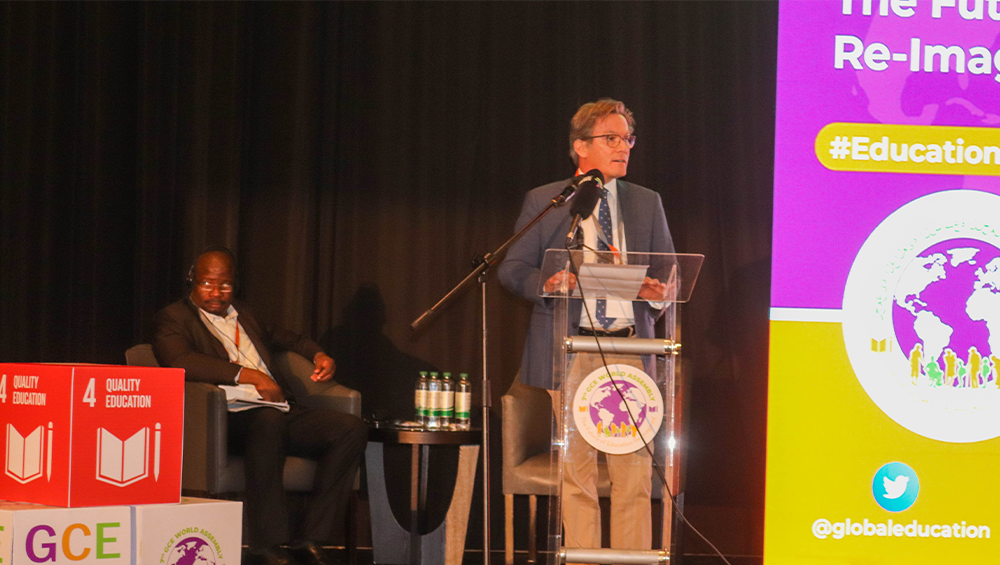7th GCE World Assembly Speech by Dr Sobhi Tawil

7th World Assembly of the Global Campaign for Education Speech by Sobhi Tawil
Johannesburg 22 November 2022
UNESCO Future of Learning and Innovation
__________________________________________________________________________________
It is a real pleasure to be here with you for the 7th World Assembly of the Global Campaign for Education on the theme of ‘The Future of Education Reimagined’.
It is also very encouraging to see how the GCE, as a global civil society movement, continues to engage with the international dynamic underway to rethink education, to transform, in order to reimagine our futures together.
A first milestone in this global dynamic is the report of the International Commission on the Futures of Education – Reimagining our futures together: a new social contract for education - which was launched exactly one year ago in November 2021.
Since its release in late 2021, the report of the Sahle-Work Commission on the Futures of Education report has become one of the key references for the Transforming Education Summit process launched by the UN Secretary General in 2022.
Why transform education?
There are two reasons to transform education.
First, despite progress in expanding access to educational opportunity, we see continued exclusion of hundreds of millions of children, youth and adults from the fundamental human right to education. We are in the third decade of the 21st century – How is this possible? It is time we rethink our models and approaches. More of the same will not do – we need to do things differently. This is reason enough to transform education.
Second, transforming education has to do with probable and possible futures. Much of the discussion about the future of education is often framed in terms of education having to adapt to broader social and economic changes. But the urgency of our moment - the urgency of the impact of continued destruction of our natural environment, of climate change, of the growing concentration of wealth and the persistent exclusion of the most economically vulnerable, of widening social divisions and the polarisation of our societies, of the democratic backsliding that we see – require not that education adapt to the wider changes – but that education help us change course/take us is a different direction, help us transform the future.
It is only by transforming education that we can hope to both rectify the persistent educational exclusions and ensure more just and sustainable futures.
What does transformation mean?
Transformation is not about doing more of the same. Transforming education implies fundamental changes to educational processes. It means going beyond reforms. Rather than better versions of existing systems, transformation implies education systems that are different from today. It is a metamorphosis.
A new social contract around education as a common good
Such transformation requires a renewed social contract for education – that is, a renewed vision of the purpose of education, a set of guiding principles, new governance arrangements, a redefinition of the roles of the range of constituencies involved in education as a collective responsibility, a public endeavor, and a common good.
The choice of the term common good, rather than public good is intentional.
- When we speak of education as a common good, we reaffirm the primacy of the collective dimension of education as a societal endeavor and a shared responsibility. It is about education that serves public interests and happens in public spaces.
- When we speak of education as a common good, we underscore the need for stronger cooperation across the range of constituencies – cooperation that is based on a commitment to the principle of solidarity and fundamental human rights.
- When we speak of education as a common good, we speak of democratic participation. That is, inclusive processes of public policy formulation and implementation with due accountability. A renewed social contract for education as a common good requires new forms and institutions of participatory democracy.
A global movement to transform education
As you know, the report of the International Commission on the Futures of Education is not a blueprint – it is an invitation to public debate, policy dialogue, research, innovation and action to transform education. It is an invitation to renew the social contract for education in order to transform education.
It requires a process – a global movement - to transform education. With its membership composed of over 120 coalitions from across 100 countries advocating for education as a basic human right, the Global Campaign for Education is best placed to bring in the critically important voices of civil society in the transformation of education.
Much as many of you engaged in the development of the Futures of Education report in 2020-2021, we now need you to build on the Transforming Education Summit dynamic, redefining a new social contract for education able to transform existing systems and ensure more just and sustainable futures for all.


